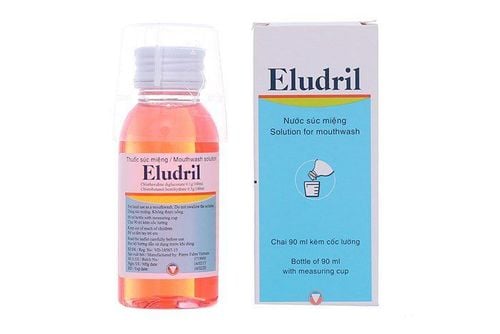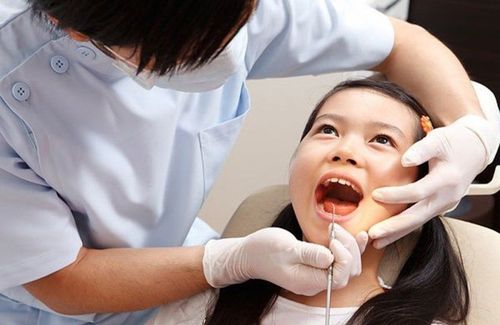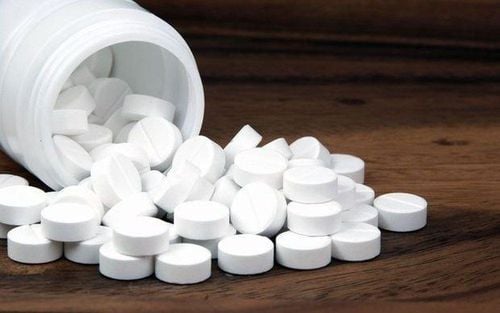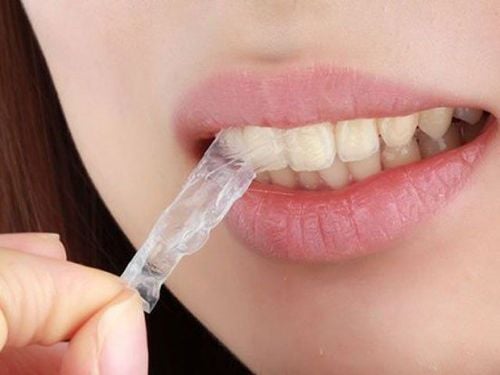This is an automatically translated article.
Tooth sensitivity is a condition in which teeth become more sensitive to hot or cold temperature stimuli and external forces. The most common causes are receding gums and enamel wear. Treating sensitive teeth is not difficult but needs to be done properly.1. What is the definition of sensitive teeth?
Teeth are composed of 3 parts from the outside to the inside: enamel, dentin and pulp. Normally, enamel covers dentin, but if the enamel layer is worn away, it will reduce its ability to protect dentin. At that time, the nerve endings in the pulp will be directly affected by hot or cold temperatures from drinks and foods. Such nerve stimulation creates pain in the root of the tooth, also known as tooth sensitivity.
Sensitive teeth, is a common dental problem that is common in young and middle-aged people and can progress over time.
2. Causes of sensitive teeth
Common causes of teeth become sensitive such as:
Improper oral hygiene: using a toothbrush that is too hard, brushing too hard horizontally to wear down the neck, damage the gums and cause exposure root. Sour foods: foods with high acid content such as toads, mangoes, oranges, tangerines, tomatoes or tea... can cause enamel erosion. Teeth grinding: strong and continuous grinding forces the chewing surface of the teeth to wear down. Mechanical impact: chewing on hard foods such as hard candy or chewing on ice or being hit by an accident can lead to cracked teeth. When the tooth is cracked, the nerve endings will be stimulated, causing the tooth to be painful. In addition, tooth cracks are also a place for bacteria that cause infection. Cavities: deep holes in the tooth, if deep into the pulp, expose the nerve endings in the tooth pulp, causing the tooth to be sensitive. Periodontitis: is an infection of the gums that causes destruction of the bone and supporting structures of the teeth, exposing the root surface of the teeth.
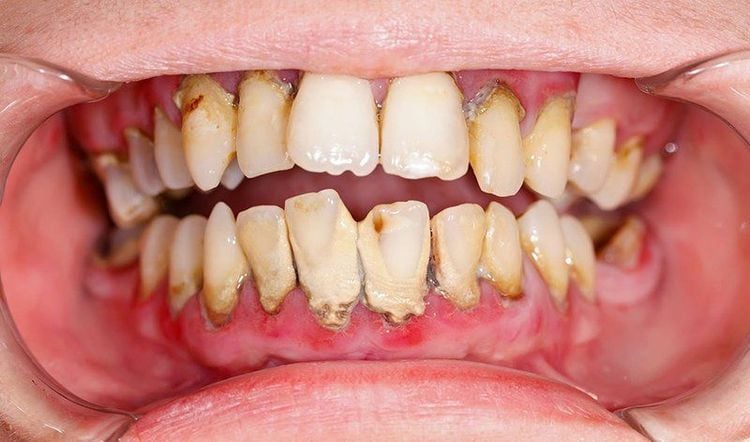
Điều trị răng nhạy cảm với nguyên nhân gây bệnh do viêm nha chu
3. How to treat sensitive teeth?
Treatment of sensitive teeth is not difficult, the general rule is to maintain oral hygiene, avoid mechanical impacts and have regular dental check-ups. Treatments for sensitive teeth include:
Proper oral hygiene is an important step in preventing sensitive teeth, tooth decay and periodontal disease. Brush your teeth with a specially formulated toothpaste for sensitive teeth at least twice a day in the morning after waking up and at night before going to bed. Use a soft-bristled brush and brush your teeth in a gentle circle, do not brush horizontally because it will wear down the neck of the tooth. Replace the toothbrush every 2-3 months or sooner if the brush is lint. Limit your intake of sugary foods, sour fruits and carbonated drinks or maybe eat an extra piece of cheese or drink a glass of milk right after eating sour foods to reduce the harmful effects of acid. Eat foods that are good for your teeth like calcium-rich foods, fiber-rich foods, whole grains, and green vegetables. Use a toothpaste containing fluoride to strengthen minerals to help strengthen the tooth structure, prevent tooth decay, and prevent sensitive teeth. In addition, desensitizing toothpaste works by blocking the transmission of sensation from the tooth surface to the nerve endings. Avoid grinding your teeth while sleeping, use a tooth guard at night to limit this situation. Fluoride gel or anti-sensitivity gel to apply to sensitive teeth. Dental intervention is the way to treat sensitive teeth if the above measures do not work. Treatments include fillings, full or partial crowns, glue to cracked or decayed teeth, gum grafts to protect the root of the tooth to reduce sensitivity, and endodontic treatment (pulp removal).
In short, sensitive teeth is a condition in which teeth are sensitive and painful when eating hot, cold, sour foods or when the weather changes. Sensitive teeth cause severe pain, make the patient feel uncomfortable and affect the quality of life. Treatment of sensitive teeth requires a combination of measures and it is best to visit a dentist for timely examination and intervention.
Currently, the Department of Dentistry - Jaw - Facial - Vinmec International General Hospital is a specialty in charge of intensive and aesthetic pathological treatment on the entire tooth structure (teeth, bone, pulp,... ), jaw (palatine, jawline, jaw joint,...) and face (frontal bone, cheekbone, temporal bone,...). The department is currently divided into main specialties, in order to serve the needs of patients such as: Restorative dentistry, maxillofacial trauma, general dentistry, cosmetic dentistry and endodontics. When there are any problems with their teeth, customers can come to be examined and have instructions from qualified doctors and dentists.
Please dial HOTLINE for more information or register for an appointment HERE. Download MyVinmec app to make appointments faster and to manage your bookings easily.





